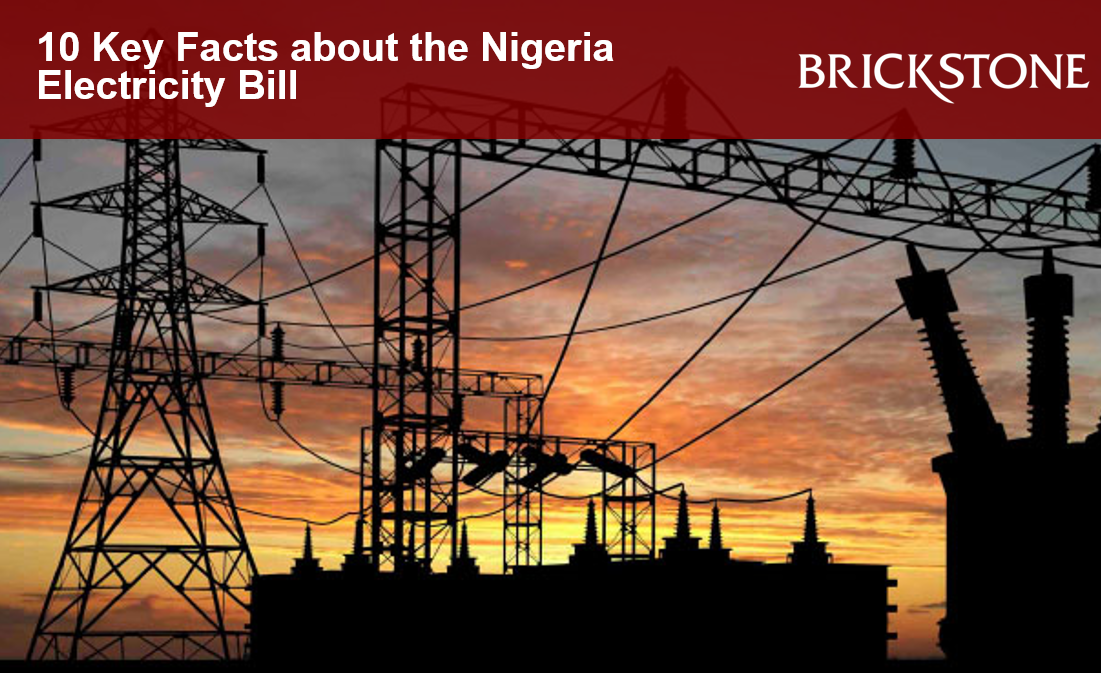10 Key Facts about the Nigeria Electricity Bill
The Nigerian Senate, on Wednesday, 20th of July, 2022, passed the Nigeria Electricity Bill 2022 sequel to the consideration of a report by the Senate Committee on Power.
The bill which is set to scale up efficient power generation, transmission and distribution capabilities, also seeks to provide an ideal legal and institutional framework to leverage on the modest gains of the privatisation phase of the electricity power sector in Nigeria.
This article by Brickstone reviews the Nigeria Electricity Bill, highlighting notable facts and innovations.
10 Key Facts about the Nigeria Electricity Bill
The Nigeria Electricity Bill, if enacted, will provide a comprehensive legal and institutional framework for the post-privatization phase of the power sector in the country in the generation, transmission, distribution, supply, trading and use of electricity.
The Nigeria Electricity Bill seeks to repeal the EPSRA, consolidate all laws relating to the NESI, introduce regulatory measures to engender the development of the NESI and stimulate the contribution of renewable energy in the energy mix. Unlike the EPSRA, the Electricity Bill contains copious provisions on renewable energy, both in respect of on-grid and off-grid renewables.
Here are 10 major highlights of the Bill:
The objectives and principles of the Nigeria Electricity Bill are, among others, to amend the Electricity Act Cap. 145 to provide for a staggered term of office for the members of the authority; to provide for additional functions of the authority; to increase funds allocated to the Electricity Regulatory Authority; to empower the minister to prescribe the procedure for transfer of generation assets to the Government; to prescribe the circumstances under which a holder of a generation license or transmission license may supply electricity to persons other than a bulk supplier.
Due to the exponential growth pace the Nigerian Electricity sector has experienced since 1999, the Nigeria Electricity Bill seeks to streamline the operations of the sector by providing remedies to the defects in the existing law, the Electricity Act. This includes but not limited to the imposition of fine on licenses for breach of terms of the license before its suspension or cancellation, increase the funding of the Electricity Regulatory Authority from 0.3% to 0.7% of the electricity sold to improve performance, and remove the monopoly of the bulk supplier and provide for sale of electricity in bulk.
The Nigeria Electricity Bill mandates the Ministry of Power to develop an Integrated Electricity Policy and Strategic Implementation Plan consultation with relevant Government Authorities and other stakeholders to guide the overall development of the electric power sector in Nigeria. The objective of this plan is to essentially guide the overall development of the Nigerian power sector. The Bill requires the Integrated Plan to incorporate specific policies including waivers and subsidies that will stimulate the development of renewable energy.
The Nigeria Electricity Bill expressly defines the duty of the NERC, which is to “promote the development and utilization of renewable energy services and increase the contribution of renewable energy to Nigeria’s energy mix”. As such, the NERC is expressly required to put in place the best possible regulatory measures aimed at fostering the utilization of renewable energy for power generation in Nigeria.
Pursuant to section 6 of the Nigeria Electricity Bill, the National assembly is granted the power to carry out oversight responsibilities and functions over the National Electricity supply industry through its respective Committees on Power in the Senate and House of Representatives. This is to be carried out notwithstanding the supervisory powers of any government Ministry over government-owned enterprises or other entities operating in the Nigerian electricity supply industry in which government has not divested its equity holdings, and irrespective of the Ministry where such entities are placed for administrative supervision by the Ministry.
Under the Nigeria Electricity Bill, electricity generation licensees are obligated to meet renewable generation obligations as may be prescribed by NERC. As such, electricity generating companies will be mandated to either generate power from renewable energy sources, purchase power generated from renewable energy or procure any instrument representing renewable energy generation. Fundamentally, the aim is to create a market for renewable energy and thereby stimulate investments in the sector.
The Electricity Bill also mandates the imposition of renewable purchase obligations on distribution or supply licensees. According to Acaslaw, the aim of imposing renewable purchase obligations on distribution licensees, supply licensees and bulk customers is to foster the consumption of energy produced from renewable energy sources and thereby stimulate the growth of the renewable energy market in Nigeria.
The Nigeria Electricity Bill states that anyone may construct, own or operate an undertaking for generating electricity not exceeding 1 megawatt (MW) in aggregate at a site or an undertaking for distribution for electricity with a capacity not exceeding 100 kilowatts (Kw) in aggregate at a site, or such other capacity as the Commission may determine from time to time, without a license.
The Nigeria Electricity Bill mandates NERC to prepare and provide for feed-in tariff rates for electricity generated from renewable energy sources as a way of encouraging investment in renewable energy power generation. According to the bill, the tariff rate will be guaranteed for a period of 10 – 15 years and subsequently be subject to review every 2 years. In determining the tariff, NERC is required to factor the price differential between the purchase price of electricity generated from renewable energy sources and the price of electricity purchased from other sources.
The proposed electricity bill added more power to the Nigeria’s minister of power. This include being responsible for the determination, formulation and monitoring of government policy for the Nigerian electricity supply industry and perform the following functions including other functions assigned to him under this Bill and other Acts of the National Assembly.
Download the complete Nigeria Electricity Bill here.





